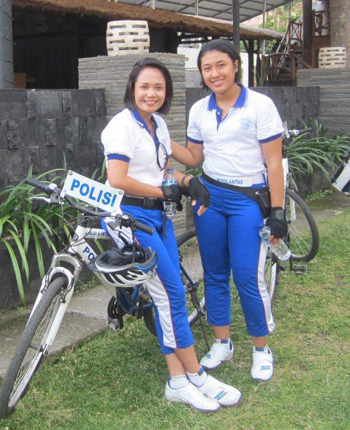Sharyn Graham Davies, Adrianus Meliala and John Buttle
A Friend and Partner of Society, John Buttle
It is no secret that Indonesia’s police force needs a face lift. Public opinion overwhelmingly depicts Indonesia’s police force (Polri) as corrupt, brutal, and inept. And public opinion is not wrong. Corruption within Polri is rampant and in some instances institutionalised. Human rights abuses inflicted by police officers are common media stories, especially in relation to conflict zones such as Papua and Poso. Stories abound of instances where police officers have demanded payment before investigating a case, or of officers abusing victims of crime, particularly sex workers. Even in instances where police do seriously investigate a crime, a lack of sufficient training and operational funding mean that, despite their best intentions, the crime is often not solved.
But Polri have recognised their shortcomings and, particularly at upper management level, there is a real desire to improve their image. Their strategy for achieving these aims does not rely on brains or brawn, though. Rather, it relies on beauty.
Policing or entertainment?
Jakartans are all too familiar with Eny Regama, Avvy Olivia Atam, and Eka Yulianti, the three police officers that present traffic reports on television. Every night, one of these policewomen appears on screen advising commuters on the quickest route into the centre of Jakarta, or updating viewers on any roads works or traffic accidents. The reports are streamed live from police headquarters and the presenters are dressed in their uniforms. These young women also sport fashionable bob haircuts and make-up that is neither too subtle nor too outlandish. Indeed, these officers present just the right mix of sexiness and seriousness to win viewers over.
This trio is just one of Polri’s secret weapons in its attempt to establish trust and rapport with the public. Polri has also made concerted efforts, and indeed passed regulations, to (literally) position policewomen as front line defenders against rowdy protest groups. In March 2012, demonstrations were organised throughout the country to protest the rise in the price of basic commodities, especially fuel. In response to planned mass protests, 33,000 police and military personnel were deployed nationwide. As an additional crowd control tactic, Jakarta police mobilised two platoons of unarmed policewomen reportedly trained in the psychology of potentially dangerous mobs.
Not only had these policewomen undergone months of training in negotiation and communication, but also they had an additional special weapon: dance moves that would appease angry crowds. Faced with an angry mob, policewomen were positioned on the front line of the police cohort and encouraged to dance using a mix of traditional and popular styles. Kitted out in their police uniforms, the policewomen danced in a line or in small groups and invited the crowd to join in. In doing so, they helped quell protester anger and provided temporary entertainment and relief from a volatile situation that threatened to turn violent.
 Police women strut their stuff, Jakarta Globe
Police women strut their stuff, Jakarta Globe
A mother’s instinct
Many reasons have been given in support of the deployment of frontline policewomen. The head of the Jakarta Police operational bureau, Agung Budi Maryoto told the Jakarta Globe that the deployment was ‘based on ethical and human-rights considerations’ because ‘if the protesters appear to be female and then the protest turns violent, male officers trying to deal with them would be prone to sexual harassment allegations’. Additionally, he observed, the policewomen could help deal with any women protesters who fainted. Maryoto also revealed that the ‘negotiation skills and relaxed presence’ of the policewomen would help to calm the mobs. Adding her support to the deployment, policewoman Siti Prihidayati noted that, ‘Policewomen have a mother’s instincts, which are soft and non-violent’.
In many respects the approach taken by Polri is a pragmatic one. In these policewomen the Indonesian public sees an image far removed from the militaristic policeman who dominates coverage of deadly clashes in Papua and Poso. For many, policewomen may seem more approachable than men, less corrupt, and more likely to respond to requests for assistance in a sensitive and polite manner.
The policewomen selected to be the public face of the Force are young, beautiful, witty and present themselves as smart and approachable. They often have Facebook pages and Twitter sites and encourage interaction with everyday Indonesians. Many of these women make guest appearances on television talk shows and radio programs, and support numerous charity events. The public seem quite receptive to this image of Polri and proffer support for a more feminine police style.
 Policewomen in Lombok patrol on bicycles, Sharyn Graham Davies
Policewomen in Lombok patrol on bicycles, Sharyn Graham Davies
A counter-productive strategy
In the short term, the tactic of deploying beautiful policewomen might be good when considering means to improve the public image of the police. But in the long term, what impact might this have on efforts to turn Indonesia’s police force from a patriarchal paramilitary institution to one that embraces gender equity?
If Polri continues to exclusively present stunning policewomen the result is that the public will only accept stunning policewomen. Moreover, with the exclusive public presentation of beautiful policewomen, women that deem themselves as less attractive may decide that policing is not for them. If this happens, then Polri, and Indonesia as a whole, will miss out on getting a police force that is representative of society, and that embraces the ranges of skills needed to address Indonesia’s numerous problems.
In addition to appearance, the constant presentation of policewomen as useful only as a distraction cheapens the value and skill women bring to the Force. Speaking to the Jakarta Post, the National Police spokesman clearly undermined women’s ability to be effective police officers when he said in relation to the fuel protests, that ‘I don’t think the protesters will use any violence against women. Should anything happen, our [male] officers will protect their female colleagues.’ This rhetoric becomes self-fulfilling and policewomen themselves come to believe that their effectiveness is limited. As policewoman Lesnusa was quoted as saying in the same article, she and her women colleagues were prepared to negotiate with the protesters, but would step aside and let their male colleagues take over if that failed.
It is in Indonesia’s best interest to have a police force that mirrors the society it polices. Having more women in Polri (as well as representation from ethnic, religious, and sexual minorities) will help the police engage in more community-focused policing, a move that will benefit all Indonesians well into the future. But while the idea of promoting Polri through the use of images of policewomen as sweet and attractive may have some positives, this understanding of femininity is likely to be counter-productive in the long term because it promotes women officers as being too weak to do anything other than stand by being caring and sexy while male officers enforce the law.
Sharyn Graham Davies (sharyn.davies@aut.ac.nz) is Associate Professor in the Department of Social Sciences at Auckland University of Technology in New Zealand. Adrianus Meliala (adrianus.meliala@ui.ac.id) is Professor of Criminology at the University of Indonesia and has recently been appointed a Commissioner of Police Complaints. Adrianus completed his PhD at the University of Queensland. John Buttle (john.buttle@aut.ac.nz) is Senior Lecture in the Department of Social Sciences at Auckland University of Technology in New Zealand.
This article stems from a larger research project that the authors are working on in the field of policing in Indonesia funded through New Zealand’s Ministry of Foreign Affairs and Trade, AUT, and the University of Indonesia.
Related Articles from the II Archive
Norman 'likes' Bollywood - Thushara Dibley and Wayne Palmer
Snatching victory - David Jansen
Back on the beat? - Adrianus Meliala
Inside Indonesia 111: Jan-Mar 2013{jcomments on}
